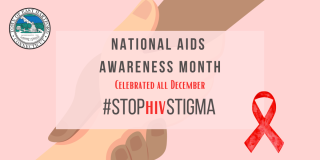December is HIV/AIDS Awareness Month

December is HIV/AIDS awareness month.
HIV can affect anyone, regardless of sexual orientation, race, gender, or age. This year, we must challenge misinformation, racism, homophobia, and transphobia to stop the stigma. Talking openly about HIV can help normalize the subject, as well as create opportunities to correct misconceptions and help others learn more about HIV. Learning the basics about HIV can also keep you healthy and prevent HIV transmission.
HIV (human immunodeficiency virus) is a virus that attacks the body’s immune system. If HIV is not treated, it can lead to AIDS (acquired immunodeficiency syndrome). There is currently no effective cure. Once people get HIV, they have it for life. But with proper medical care, HIV can be controlled. People with HIV who get effective HIV treatment can live long, healthy lives and protect their partners.

How does a person transmit or contract HIV?
HIV may be transmitted through certain bodily fluids that are capable of containing high concentrations of the virus. These fluids include:
- blood
- semen
- vaginal secretions
- rectal secretions
- breast milk
Other bodily fluids, such as tears, saliva, and sweat, do not transmit the virus.
How is HIV transmitted from person to person?
HIV is transmitted when a person who has measurable amounts of the virus in their body passes fluids directly into the bloodstream or through mucous membranes, cuts, or open sores of a person without HIV. Some common and uncommon ways that HIV is transmitted include:
- Sex: HIV exposure can occur during sexual intercourse. Both anal sex and vaginal sex have risks of HIV transmission. Receptive anal sex has the highest risk of transmission among sexual activity.
- Sharing injection drug equipment. Sharing needles for injecting drugs transmits HIV most efficiently. This is because used needles and syringes can still contain blood, which can carry the virus.
- Oral sex. Oral sex is a less common way to transmit HIV. However, some factors that may increase the risk of HIV transmission through oral sex include:
- open sores in the mouth or on the genitals
- bleeding gums
- having other types of sexually transmitted infections (STIs)
- Blood transfusions and organ donation. The risk of contracting HIV from a blood transfusion, other blood products, or organ donation is now extremely rare in the United States. All donated blood or blood products in the United States are tested for several types of bloodborne pathogens, including HIV.
- Pregnancy and breastfeeding. HIV can also be transmitted from a pregnant person to their child during pregnancy, delivery, and through breastfeeding. However, recommended testing of all pregnant people for HIV has greatly reduced the number of babies who contract HIV in this way.
- Deep, open-mouth kissing. While the virus cannot be transmitted by saliva, transmission can occur if blood is present. This can happen when both partners have bleeding gums, open cuts, or sores in their mouths.
Ways HIV Cannot be Transmitted
There’s no need to be afraid of having casual contact with someone who is living with HIV. The virus does not live on the skin and cannot live very long outside the body. Here are some ways that HIV cannot be transmitted:
- saliva
- tears
- sweat
- holding hands
- hugging
- shaking hands
- sharing a toilet
- sharing dishes
- through air and water
- sitting next to someone with HIV
- closed-mouth kissing
- scratching surface skin
- a bite that doesn’t break the skin
- insects that bite, like ticks and mosquitoes
- other casual contact that does not involve transmission of bodily fluids
Does HIV load affect HIV transmission?
Having a detectable or measurable viral load can be a risk factor of HIV transmission. Viral load is the amount of virus that can be detected in the blood. The rate of HIV transmission goes up with increasing viral load. Viral load is highest both during the early (acute) phase of HIV and without treatment with antiretroviral medications. Taking antiretroviral medications every day can reduce a person’s viral load to very low levels that cannot be detected through testing.
In this way, antiretroviral medications are not only a treatment, but an important tool for prevention. When HIV cannot be detected in the blood, a person living with HIV cannot sexually transmit the virus to a partner without HIV. It can take up to 6 months of taking antiretroviral medications each day to achieve an undetectable viral load. A person’s viral load is said to be “durably undetectable” when all test results are undetectable for at least 6 months after the first undetectable result.
Additional Resources
- HIV Risk Reduction Tool
- Find Local HIV Prevention Services
- HIV Basics (Video)
- Pre-Exposure prophylaxis (PrEP)
- Post-Exposure Prophylaxis (PEP)
For more information or referral to treatment, please conact the East Hartford Health Department at 860-291-7324.
Sources: CDC

